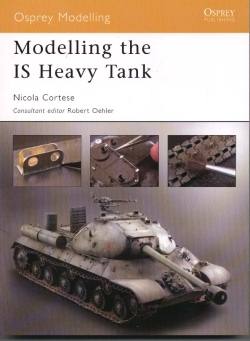 Osprey
Modelling 9, Modelling the IS Heavy Tank, by Nicola Cortese, ISBN 1-84176-757-3,
82 pages. Osprey
Modelling 9, Modelling the IS Heavy Tank, by Nicola Cortese, ISBN 1-84176-757-3,
82 pages.
I’ve been looking forward to this book, and I’m not disappointed!
Nicola’s first model here is the DML ISU-152, for which he includes
notes and photographs showing how to correct the height of the lower
hull – also noted as applicable to the other DML kits used in the
book. Next is the DML IS-2 with a modified Maquette T-34 engine and
Jaguar hull and turret interior with ideas on modifying them for greater
realism. The third chapter covers the Trumpeter IS-3M, then comes the
Tamiya IS-3 with a Maquette engine again and Aber etch, but with scratchbuilt
pannier stowage bins and engine deck. The final 1/35 build is Cromwell
Models’ ISU-152 model 1945 conversion. Then in 1/76 scale there
are the Fujimi IS-2 and IS-2M. All the models are given scratchbuilt
improvements such as new engine deck hatches, stowage bins, grilles,
etc and some use etched sets and aftermarket tracks. All the chapters
include clear descriptions and photographs of the work, so readers can
make the same changes to their models, and the colour-chart end page
gives a selection of colours for Soviet and Egyptian schemes with notes
on their uses.
Highly recommended!
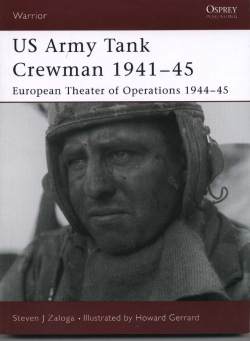 Warrior
78, US Army Tank Crewman 1941-45, European Theatre of Operations 1944-45,
by Steven J Zaloga, illustrated by Howard Gerrard, ISBN 1-84176-554-6,
64 pages. Warrior
78, US Army Tank Crewman 1941-45, European Theatre of Operations 1944-45,
by Steven J Zaloga, illustrated by Howard Gerrard, ISBN 1-84176-554-6,
64 pages.
This is an excellent account of how tank crewmen were selected, trained
and went into action. Steve Zaloga uses Creighton Abrams as an example
since he was involved in the training of the 4th Armored Division as
well as being an outstanding combat leader, but the combat section which
takes up most of the book includes many other named men’s experiences.
The photographs are very well chosen, and include several of Abram’s
Thunderbolt Shermans - also covered in the plates – as well as
many other tanks and men. Very highly recommended, don’t miss this
book.
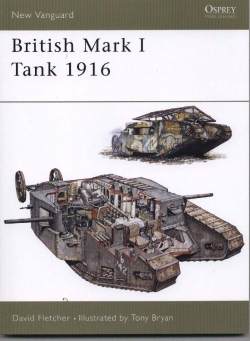 British
Mark I Tank 1916, by David Fletcher, illustrated by Tony Bryan, ISBN
1-84176-689-5, 4 pages. British
Mark I Tank 1916, by David Fletcher, illustrated by Tony Bryan, ISBN
1-84176-689-5, 4 pages.
This is an excellent book about the first tanks. It starts with Little
Willie, the very first tank, and Mother, the prototype for the Mark
I, and then looks at the Mark I’s construction, crew duties and
use in battle. Colour schemes are discussed with great authority, David
Fletcher being an acknowledged expert on British tanks of the period,
and the Mark II and Mark III are also included. Combat use in France
and Palestine is well-covered, with useful photographs and colour plates
to show what the tanks and their markings looked like. Highly recommended,
even though we have no kit of the Mark I don’t miss this book or
you’ll be stuck when a kit eventually appears.
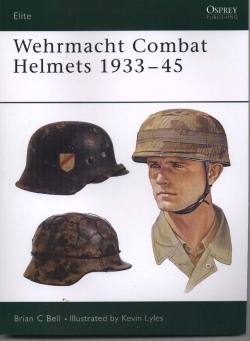 Elite
106, Wehrmacht Combat Helmets 1933-45, by Brian C Bell, illustrated
by Kevin Lyles, ISBN 1-84176-725-5, 64 pages. Elite
106, Wehrmacht Combat Helmets 1933-45, by Brian C Bell, illustrated
by Kevin Lyles, ISBN 1-84176-725-5, 64 pages.
You might be thinking that the German “coal-scuttle” helmet
only came in one variety. Wrong! There were a number of variations,
plus of course the Fallschirmjaeger helmet, and this book gives you
the information to tell them apart either as a collector like the author
or when checking photographs for modelling purposes. Plenty of clear
photographs are included, and as well as excellent plates there are
also colour photos of preserved examples with their original colour
schemes – they weren’t just painted “field grey”
and all the known colours are mentioned. Recommended.
 Battle
Orders 5, US Army in the Plains Indian Wars 1865-91, by Clayton S Chun,
ISBN 1-84176-584-8, 96 pages. Battle
Orders 5, US Army in the Plains Indian Wars 1865-91, by Clayton S Chun,
ISBN 1-84176-584-8, 96 pages.
This is an excellent reference for anyone modelling figures of the
Indian Wars on the Great Plains. It gives a complete breakdown of the
infantry, cavalry and artillery units involved with their duty stations
and commanders at each of the main action periods. Not only that, but
an account of the US Army’s doctrine and training – which
were mainly aimed at fighting a conventional war – and an analysis
of organisation. Tactics are discussed, both theoretical and actual.
The whole book is replete with useful information, including such gems
as a note that very few frontier posts actually had the stockades so
beloved of Hollywood. Recommended!
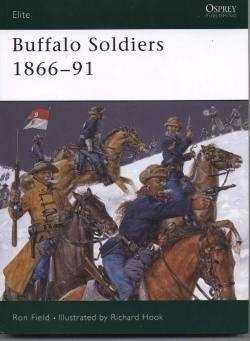 Elite
107, Buffalo Soldiers 1866-91, by Ron Field, illustrated by Richard
Hook, ISBN 1-84176-756-5, 64 pages. Elite
107, Buffalo Soldiers 1866-91, by Ron Field, illustrated by Richard
Hook, ISBN 1-84176-756-5, 64 pages.
This book looks at the Buffalo Soldiers in considerable detail. These
African-American units had a great fighting record in the Indian Wars,
and their organisation and battle record is well covered here. Contemporary
photographs and drawings show what they looked like on campaign and
on post, and are ably backed up by excellent colour plates (which include
thedefence of one of those few stockaded forts). Highly recommended.
 Campaign
142, Dunbar 1650, Cromwell’s most famous victory, by Stuart Reid,
illustrated by Graham Turner, ISBN 1-84176-774-3, 96 pages. Campaign
142, Dunbar 1650, Cromwell’s most famous victory, by Stuart Reid,
illustrated by Graham Turner, ISBN 1-84176-774-3, 96 pages.
King Charles II landed in Scotland with few troops, thinking that
the Scots would rally to him. They were not overly enthusiastic, but
he did get some support. Cromwell, meanwhile, led his army into Scotland
to stop Charles getting ensconced as king of Scotland and obtaining
a base to invade England. The battle at Dunbar was the result, and Cromwell’s
victory meant that the English Civil War dragged on for more years.
Here is the story, in detail. Recommended for everyone with an interest
in the ECW.
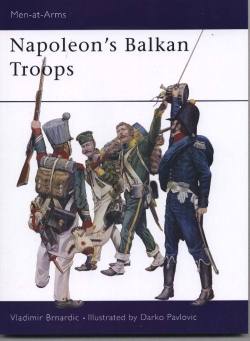 Men-at-Arms
410, Napoleon’s Balkan Troops, by Vladimir Brnadic, illustrated
by Darko Pavlovic, ISBN 1-84176-700-X, 48 pages. Men-at-Arms
410, Napoleon’s Balkan Troops, by Vladimir Brnadic, illustrated
by Darko Pavlovic, ISBN 1-84176-700-X, 48 pages.
Here’s a great book for modellers of Napoleonic figures who’d
like something a bit different but without extensive conversion work.
Napoleon raised battalions in the Balkan States who wore very French
uniforms but in different colours, and also units with very Austrian
uniforms for those who like converting figures. There were also units
with completely different uniforms based on their traditional dress,
like the Albanian Regiment and the Croatian Serrezaners – excellent
for anyone looking for a colourful major conversion! There’s something
for all grades of figure modeller here: highly recommended!
 New
Vanguard 99, Space Shuttle Launch System 1972-2004, by Mark Lardas,
illustrated by Ian Palmer, ISBN 1-84176-691-7, 48 pages. New
Vanguard 99, Space Shuttle Launch System 1972-2004, by Mark Lardas,
illustrated by Ian Palmer, ISBN 1-84176-691-7, 48 pages.
This book gives the history of the Space Shuttle from day 1 with emphasis
on its military launches. The differences between the shuttles are described
and explained, and so are their varied markings. All the known military
missions are described, and there are separate histories of each shuttle
as well. Excellent stuff, well illustrated and just what space modellers
need. Recommended.
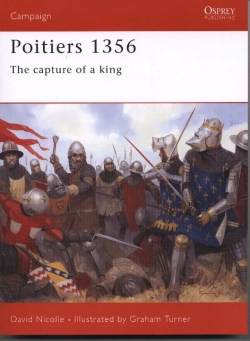 Campaign
138, Poitiers 1356, the capture of a king, by David Nicolle, illustrated
by Graham Turner, ISBN 1-84176-516-3, 96 pages. Campaign
138, Poitiers 1356, the capture of a king, by David Nicolle, illustrated
by Graham Turner, ISBN 1-84176-516-3, 96 pages.
Here’s a good description of the 1356 fighting in the Hundred
Years War, from the start of the Black Prince’s “chevauchee”
to the culminating battle near Poitiers that saw the capture of the
king of France. The text is backed up by good maps and bird’s-eye
views, and the illustrations and plates are equally good. This one should
be on your bookshelf if the Hundred Years War interests you, you won’t
find a better reference to this campaign. Recommended!
My thanks as always to Osprey for the review books. If you don’t
have a local stockist these books can be ordered online direct.
|
|
 Osprey
Modelling 9, Modelling the IS Heavy Tank, by Nicola Cortese, ISBN 1-84176-757-3,
82 pages.
Osprey
Modelling 9, Modelling the IS Heavy Tank, by Nicola Cortese, ISBN 1-84176-757-3,
82 pages. Warrior
78, US Army Tank Crewman 1941-45, European Theatre of Operations 1944-45,
by Steven J Zaloga, illustrated by Howard Gerrard, ISBN 1-84176-554-6,
64 pages.
Warrior
78, US Army Tank Crewman 1941-45, European Theatre of Operations 1944-45,
by Steven J Zaloga, illustrated by Howard Gerrard, ISBN 1-84176-554-6,
64 pages. British
Mark I Tank 1916, by David Fletcher, illustrated by Tony Bryan, ISBN
1-84176-689-5, 4 pages.
British
Mark I Tank 1916, by David Fletcher, illustrated by Tony Bryan, ISBN
1-84176-689-5, 4 pages. Elite
106, Wehrmacht Combat Helmets 1933-45, by Brian C Bell, illustrated
by Kevin Lyles, ISBN 1-84176-725-5, 64 pages.
Elite
106, Wehrmacht Combat Helmets 1933-45, by Brian C Bell, illustrated
by Kevin Lyles, ISBN 1-84176-725-5, 64 pages. Battle
Orders 5, US Army in the Plains Indian Wars 1865-91, by Clayton S Chun,
ISBN 1-84176-584-8, 96 pages.
Battle
Orders 5, US Army in the Plains Indian Wars 1865-91, by Clayton S Chun,
ISBN 1-84176-584-8, 96 pages. Elite
107, Buffalo Soldiers 1866-91, by Ron Field, illustrated by Richard
Hook, ISBN 1-84176-756-5, 64 pages.
Elite
107, Buffalo Soldiers 1866-91, by Ron Field, illustrated by Richard
Hook, ISBN 1-84176-756-5, 64 pages. Campaign
142, Dunbar 1650, Cromwell’s most famous victory, by Stuart Reid,
illustrated by Graham Turner, ISBN 1-84176-774-3, 96 pages.
Campaign
142, Dunbar 1650, Cromwell’s most famous victory, by Stuart Reid,
illustrated by Graham Turner, ISBN 1-84176-774-3, 96 pages. Men-at-Arms
410, Napoleon’s Balkan Troops, by Vladimir Brnadic, illustrated
by Darko Pavlovic, ISBN 1-84176-700-X, 48 pages.
Men-at-Arms
410, Napoleon’s Balkan Troops, by Vladimir Brnadic, illustrated
by Darko Pavlovic, ISBN 1-84176-700-X, 48 pages. New
Vanguard 99, Space Shuttle Launch System 1972-2004, by Mark Lardas,
illustrated by Ian Palmer, ISBN 1-84176-691-7, 48 pages.
New
Vanguard 99, Space Shuttle Launch System 1972-2004, by Mark Lardas,
illustrated by Ian Palmer, ISBN 1-84176-691-7, 48 pages.